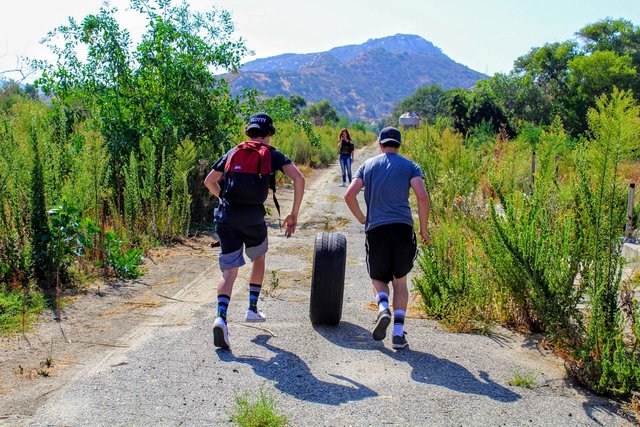How Information overload can affect our personal growth and ways to prevent them
The information overload (also known as cognitive overload) occurs when we have access to too much information to make a decision. This is a problem that has spread especially with the development of Internet and web browsing support technologies .
In the past, when we needed reliable information, we asked for an opinion from an expert, consulted an encyclopedia, or went to the library.

Credits
Today - in the digital age - all you need is a smartphone or a tablet that connects to the Internet to always have at hand (and click) - wherever you are - for an inexhaustible source of information. Whatever our cognitive need, a search of a few seconds is sufficient to find oneself "submerged" by numerous informative sources .
Which to draw from? Which ones to rely on? How to discern between one source and another? How to establish a point of reference for your decisions? How to get out "saved" from this "sea" of information? They are all questions that can disorientate and block our decision-making process . Little wonder, then, that the information overload may cause even a real disease , resulting in a footprint of Internet addiction .
In this case we talk about "Information Overload Addiction": the person who suffers from this disorder tends to search compulsively and unrestrained information on the Internet , passing obsessively and quickly from one website to another. He feels the need to stay up to date: often check the email box, frequently update pages, sign up for numerous newsletters, constantly monitor social networks. The information overload also results into an excessive amount of files saved on the PC or web pages inserted among the favorites ; all data - often irrelevant - which do not help the individual make a decision or focus on a single topic .
The feeling is that of never feeling sufficiently informed and of running the risk of letting some important information slip away . The information overload inevitably becomes a source of conflicting opinions, and this generates confusion and frustration . The individual thus enters a spiral of obsessive search for information that leads him to spend most of his free time or work in this activity , often useless and counterproductive .

Credits
Information overload does not make an educated person
Knowing how to manage information overload is important for one's personal growth as one of the fundamental principles for success is to discern the information that is useful for achieving one's own goals and those that do not fulfill this task . Overloading useless information does not in itself constitute a form of education. It is not the knowledge that is an end in itself that makes an educated person, but the way in which the acquired knowledge is used and put at the service of its own purposes.
Being a living encyclopedias is useless! The theory, to be effectively useful, must then find direct application in the experience, and it is precisely this passage that requires an "accurate selection" of the information to focus on .

Credits
How to manage the overload of information deriving from the Internet in a practical way
Here is a set of practical strategies for managing the most of information overload resulting from the Internet :
Disconnect from social networks or turn off their notifications during the times of the day when you are engaged in other activities (like sourcing for knowledge) - We should dedicate only one "session" to the social networks a day (possibly short), and not remain constantly connected to read the contents! In addition, try to make the experience on social media something useful for your personal or professional growth : share interesting information that will benefit your friends (even on steemit) , chat in order to take care of social relationships you particularly care for, or admire multimedia content that can somehow enrich you. Using social networks to feed your ego by uploading photos or sharing content only for an ephemeral "like" is from insecure and empty people. Do not fall into this trap: be constructive , even when you use social networks!
Clean the e-mail inbox by deleting old emails and unsubscribe from all the newsletters that you no longer read or do not consider particularly interesting- Do not check your e-mail box every half hour, at least if you do not really need it. Usually it is good to dedicate yourself to e-mails twice a day: once in the early morning and another time in the evening after 6 pm. Pay close attention to the relationship between information overload and email : unlike other information sources, email can provide you with information even when you do not want it (for example, in the case of spam).
- Delete from your PC all those useless files, which you may have downloaded only out of pure curiosity, but which then have not responded to any particular need for information- True, the memory of a PC is huge and allows you to store lots of information, but this should not be an excuse to leave all those files obsolete.
- Streamline your information sources, reading only a few but authoritative websites, and avoid keeping more than 10 tabs open in your browser at the same time- For example, when I need to find a Vocabulary, to look up a word on a dictionary or solve a grammatical doubt, I rely solely on the online services of Macmillan Dictionary.
This does not mean that there are no other authoritative sources; it only means that I do not waste time on further research, but I focus only on those sources that I am sure can provide me with reliable information. Sure,it is not always possible to rely on sites of undisputed authority. My advice in these cases is to carefully analyze the source you are consulting : an excessively informal language (sometimes called "fresh") or frequent grammatical errors are symptomatic of an informative source of little importance. In the case of scientific information, there should be related studies, a supporting bibliography or an opinion from a competent person (scientist, physician, chemist, etc.) . Also, do not give good news to information you find on the Internet only because they are positioned at the top of search engines ; in this case you would risk to accrue an injury so that it remains anchored to the information initially consulted without being able to take into account other information as well. Rather, pay attention to those who disclose them. If it is a blog, get as much information as possible.
Do not focus on the negative and what is only a waste of time- Another strategy to manage information overload is to avoid getting too involved with negative or unproductive news . Reading (or listening to) news broadcasts continually fills you with dramatic news that does not bring any benefit to your personal growth. It's important to stay informed, but there's no need to read news every day! Furthermore,when surfing the Internet (websites, YouTube, social networks, etc.), avoid clicking on frivolous content and high-sounding titles just out of pure curiosity, thus losing time watching videos, images or reading links and futile news, trivial and unnecessary. The lightness, the healthy and the smiling, the one that makes life more jovial, it is better to live it with real experiences, and not simply to search it on the Internet! In fact, often the lightness on the web results in demented content , and it is not exactly the best to be distracted by something that defines "demented" ... Your time is worth and your attention is precious: focused on interesting and productive things, able to empower you instead of devaluing yourself intellectually by staying focused on worthless information.
- Avoid information overload by considering the ROI of your Internet activities
One last consideration: to avoid that the information overload complicates your life, try to think in terms of ROI (Return on Investment) . Imagine the time you spend reading web content, emails and social networks as an investment you make on yourself, then ask yourself: what is the return ? I would like you to share the answer to this question in the comments below.
Good important information
To listen to the audio version of this article click on the play image.

Brought to you by @tts. If you find it useful please consider upvote this reply.
Wao good inofrmation, congratlations, greetings from Venezuela!!!
Good Post, good information, never we can forget take time to rest, really really important!
Your post made me realize that information overload is a problem. Looking at it now, I find out that addiction to the internet without returns is useless.
Nice topic. Information overload definitely burdens the decision process, and decision fatigue is a potent drain on energy. Creating habits and routines can help, if you always interact with the internet in the same way you'll be less likely to stray into distractions.
I have also suffered this in the past, the last time I went through this was when I joined steemit and i was trying to digest every information out there, thanks for sharing the helpful tips.
Hello that is a very interesting theme i knew about overstimulation with children i didnt know about overload with adults but it does make sense.
This is soooo definitely me.